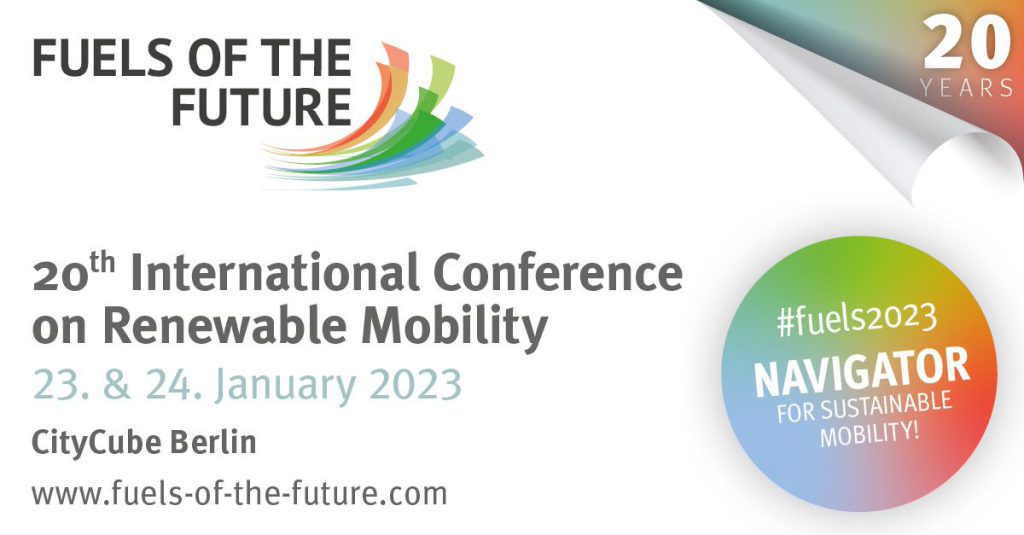A total of 15 sessions with more than 60 speakers and an international audience are offered in the CityCube Berlin. The congress offers technical discussions, personal exchange with experts and numerous networking opportunities. Information and registration via: www.kraftstoffe-der-zukunft.com
Those who take part in the event are spoiled for choice. Because parallel to the plenary sessions, other session groups take place, which sound out individual topics in great detail. Energy and sustainability are international issues. Therefore, the specialist congress will be held in two languages (German-English). The organisers are the Bundesverband Bioenergie e. V. (BBE), the BDBe Federal Association of the German Bioethanol Industry e. V., the Union for the Promotion of Oil and Protein Plants e. V., the association of the German biofuel industry e. V. and the Fachverband Biogas e. V
The patron of the event is the German Federal Ministry for Digital Affairs and Transport. That is why Oliver Luksic, Parliamentary State Secretary at the Federal Ministry for Digital Affairs and Transport (BMDV), has announced himself as a prominent speaker. With the Ministerial Director Dr. Anita Breyer from the German Federal Ministry for the Environment, Nature Conservation, Nuclear Safety and Consumer Protection (BMUV) and the MEP Norbert Lins will accompany the congress with further political accents.
Energy transition in transport in the area of tension between security of supply and climate protection: This is the main title for the first sessions. The aim is also to explore the extent to which the Russian war in Ukraine has led to a new understanding of the energy problem and to a shift in emphasis in relation to climate protection. “Implementation of the RED III: What will the quota regulations in the EU look like in the future?” This topic will be dealt with as well as news about bioethanol, biomethane and e-fuels.
“In the transport sector in particular, we must immediately expand renewable energies even more quickly, dynamically and efficiently in order to free ourselves from fossil energy imports and the related dependencies as quickly as possible and, above all, to still be able to achieve the ambitious climate protection goals.” With these words Artur Auernhammer, Chairman of the Board of the German Bioenergy Association, explains the relevance of the specialist congress. Auernhammer is certain: the climate change will only succeed if all available technology options are used.
“Biofuels and renewable fuels are essential for immediately effective climate protection and energy security,” emphasizes the association’s chairman. “For example, biofuels are currently being mixed with fossil fuels in Germany due to the greenhouse gas reduction quota (GHG quota) in order to effectively reduce emissions in traffic. Compared to fossil fuels, biofuels reduce emissions by up to 92 percent and saved around 13.2 million tons of climate-damaging CO2 in Germany in 2020 alone.”
In addition, biofuels currently account for over 98 percent of renewable fuels energies in road traffic in Germany and replace fossil fuel imports almost 1:1, explains Auernhammer. From today’s perspective, replacing them in the short and medium term with regard to climate protection is not possible: “Without biofuels, not only will dependence on fossil energy imports increase, but without them the climate protection goals in the transport sector will simply not be achievable in the coming years. We can neither wait for climate protection nor do without replacing oil imports. Because, as already mentioned, a clear compass with reliable and investment-safe navigation is crucial for the path to renewable mobility.”
Of course, it is ideal if waste materials can still be used as sustainable fuels that promote climate change. The German SME Association for Waste-Based Fuels (MVaK) is dealing with this question. The corresponding session promises exciting insights with lectures such as “From mixed plastic waste to fuel”, “NEXXOIL READi – A new process for the production of fuel from polluted waste fats” and “Challenges in the analysis of new advanced raw materials”. Sessions are dedicated to special industry needs, which show the possible uses of sustainable fuels in agricultural vehicles, in shipping transport and in ports as well as aviation.
Sometimes the colour “green” comes along with a strong odor. But the lecture “Green hydrogen from liquid manure – CO2-negative fuel from agriculture” shows: Research is going in many directions and could turn foul-smelling digestive residues into the gold of the future – that’s a good thing!
Hermann Schmidtendorf, Editor-in-Chief









